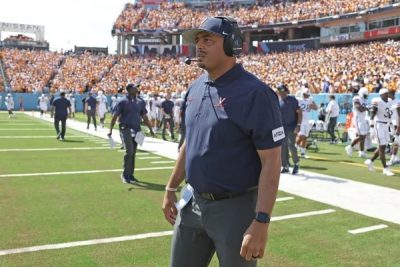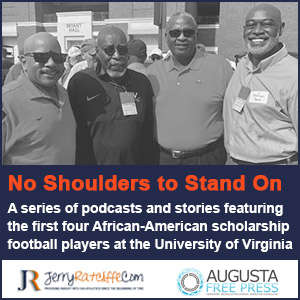Elliott: there was more to Saturday’s game than the scoreboard
By Jerry Ratcliffe
No one gave rebuilding Virginia a snowball’s chance of threatening powerful Tennessee, the nation’s 12th-ranked team, in Saturday’s season-opener.
The boys in Vegas made the Vols, a team expected to give Georgia a battle for SEC East supremacy, a four-touchdown favorite. Smart money was betting Tennessee, featuring one of the country’s most explosive offenses, to cover the spread.
UVA, coming off a tragedy-marred 3-7 season, must have felt like it was walking into the lion’s den, facing UT in Nashville’s sold-out Nissan Stadium, packed with nearly 70,000 rabid fans wearing the wrong color of orange.
Certainly, this game had another story, a story that only the ones who lived it every day since last November could truly relate. It was the story of three beloved teammates who were senselessly gunned down, leaving a program, a university, a community to mourn.
Tennessee respectfully paid tribute to the fallen Cavalier trio, as did ABC Sports along with the UVA team (see related game story for those details). While Tony Elliott and his team celebrated returning to football, the predictions of a lopsided contest were accurate, a 49-13 Volunteers rout, which could have been worse had Josh Heupel’s team not blown some early opportunities to pile up points (Tennessee led only 7-0 midway through the second quarter).
While Heupel & Co. were preoccupied with impressing pollsters, Elliott’s Virginia squad was just happy to be playing football again. Even though it was a mismatch, the Cavaliers found some things to build on going forward. The focus was on the game, but there were thoughts of the past that haunted UVA throughout the day.
“It’s hard to quantify and put into words just everything that they have had to go through just to get to this point,” Elliott said of his team. “I thought the guys showed up and had a really good spirit about them, great energy, and I thought they played extremely hard. They fought and they battled and that’s all you can ask from these guys.
“Just to see them get a chance to play football was the victory for me. I know ultimately we’ll be judged by what the scoreboard says. Internally, as a program, I couldn’t be more proud of a group of young men. What we had to endure was unprecedented.”
Elliott was eager to find out where his program stood by playing one of the nation’s best teams, and it didn’t take long to determine there’s a huge chasm.
Tennessee, which returned numerous playmakers from the nation’s No. 1 offense a year ago, piled up 499 yards of total offense — 287 on the ground, 212 through the air — mostly from senior quarterback Joe Milton III, who is credited with having the strongest arm in college football.
Virginia’s defense played admirably in spite of being put in challenging situations by an offense that struggled to move the chains, hauntingly similar to last year when the Cavaliers fielded one of the worst offenses in the nation. This time around, with mostly a new cast of characters, the results weren’t much better.
UVA mustered 95 yards rushing, which included 45 yards in losses due to four sacks and 10 tackles for loss as starting senior quarterback Tony Muskett was under duress the entire game, until he was sidelined with a shoulder injury early in the fourth quarter. Muskett was 9 of 17 passing for 94 yards before giving way to true freshman backup Anthony Colandrea (2 of 7 for 12 yards).
Perris Jones and Clemson transfer Kobe Pace each rushed seven times for an identical 39 yards, both contributing heavily to Virginia’s lone touchdown drive, a 75-yard march late in the third quarter that made it 35-10. In that eight-play drive, the two backs combined for seven rushes, Jones taking it the final 17 yards on a burst to the end zone.
It was one of the bright spots in the game for Virginia’s offense behind a mostly inexperienced, unproven offensive line, perhaps giving hope of the Cavaliers’ desire to field a reliable ground attack as the season unwinds.
“Probably kicking myself, I should’ve forced the run maybe a little more early in the game,” Elliott said afterward. “Still, when we were handing it off, we didn’t quite have the push or the backs weren’t quite finding it. That’s the thing with the running game, you’ve got to stick to it and be consistent to get the backs lathered up so they can find it.
“Encouraged to see how the guys fought, encouraged for the running back room because they have a chance now to show some leadership. But we probably should’ve tried to run the ball a little bit more in the first half to see if we could settle the offense down as opposed to being as aggressive as we were.”
While Tennessee’s offense scored on its first possession of the game, the Vols seemed out of sync for much of the first half, missing on deep passes, botching a fourth-and-one gamble at their own 25-yard line and giving UVA a short-field opportunity it couldn’t capitalize on with a missed 28-yard field goal by Will Bettridge in the first quarter.
UT’s defense, however, executed the game plan to near perfection. With an aggressive front seven, the Vols planned to shut down Virginia’s running game, force the Cavaliers into third-and-long passing situations and use their speedy pass-rushing unit, the “Cheetah package,” to pressure Muskett.
The Virginia quarterback was under constant pressure, and while he didn’t complete many passes while running for his life, Muskett didn’t throw an interception.
UVA’s inability to move the chains kept the defense on the field too much, which eventually wore them down as the game progressed.
“I told the guys in the locker room, part of having a winning mindset is humility,” Elliott said. “To learn how to win, you’ve got to learn how to lose and take a loss. There’s going to be a lot of learning in this experience. We’ll flush it Sunday, and Monday we’ve got to get our minds right for JMU.
“I’ve got to coach better, we’ve got to play better, we’ve got to execute better. We all know that. It’s a great opportunity, as I told them, this is the first week, it’s a small sample size. We’re going to learn from it and then we’re going to put it behind us and go focus on the next one.”









